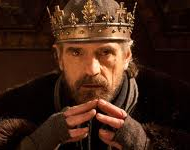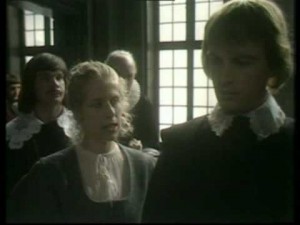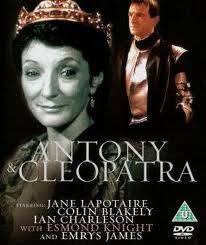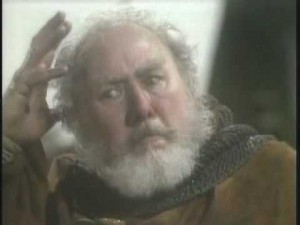Tucked away on the BBC2 TV schedule at 11.20 on Tuesday evening is the last of the Shakespeare Uncovered series, David Tennant on Hamlet. Not only does it feature David Tennant, whose own Hamlet for the RSC in 2008 was a massive hit, but he takes the opportunity to speak to other notable recent Hamlets Jude Law, Simon Russell Beale and Ben Whishaw. Simon Russell Beale is having quite a Shakespeare summer himself having just played Falstaff in the BBC’s The Hollow Crown series and is now beginning to play Shakespeare’s least-known leading man, Timon of Athens, at the National Theatre.
I mention this particularly because, with all the Shakespeare, not to mention all the sport, this summer the BBC’s scheduling has been pretty erratic. The first two parts of The Hollow Crown were meant to be on at 9pm, but one was delayed by the tennis at Wimbledon. The second two in the series have been scheduled for 8pm, an hour earlier. I was listening in on #hollowcrown on Twitter on Saturday and it was clear from people’s tweets that many hadn’t got that message. So here’s your warning: on Saturday evening, the culmination of the series, Henry V begins at 8pm. Don’t be late!
Shakespeare Uncovered has been a fascinating mix, including contributions from Joely Richardson along with her mother Vanessa Redgrave looking at Shakespeare’s women, Ethan Hawke on Macbeth, Trevor Nunn on The Tempest, Derek Jacobi on Richard II and Jeremy Irons on the Henry IV and Henry V plays. The programmes have each been very different, and on Tuesday, it’s David Tennant’s turn to talk about the gloomy Dane. Indications are that it’ll be good stuff.
David Tennant’s Hamlet was filmed for TV and it’s a fair bet that we’ll be seeing a few clips from this version during the show. Just recently there’s also been a discussion going on about the whole subject of filming Shakespeare for TV, sparked off by The Hollow Crown, and perhaps encouraged by the amount of productions like those from the Globe and the National which are now made available to watch in cinemas. This year the Globe to Globe productions, staged from April to June, were also filmed and are gradually being made available on the Space.
But the issue that’s got people going is Richard Eyre’s contention in a recent article that filming stage productions, even fine adaptations like the David Tennant Hamlet and the recent African Julius Caesar, both directed by Gregory Doran, is not the same as, and not as good as, reimagining the plays for the small screen, as The Hollow Crown has done.
From the end of the 1970s to the mid-1980s the BBC undertook an ambitious filming of all of Shakespeare’s plays for transmission on TV. Respondents to Richard Eyre’s piece on the Illuminations blog have taken widely differing views of these plays. They are often remembered as clunky, studio-bound and unimaginative. But at the time they were a revelation. For many people they were the only Shakespeare they would ever get to see. Hardly anybody had video recorders, and if I remember correctly, the programmes were shown only once with no repeat. And only the most popular plays were released on video. Ironically some of these were the poorest productions. So it’s only within the last few years since the whole 37 have been released on DVD that some of the best, like Pericles, have been seen again. The Shakespeare Centre Library acquired the complete series as they came out and people came from all over the country to see them.
Although the productions were not as glamorous as The Hollow Crown many of them featured top-notch actors: Ian Charleson as Bertram, Jane Lapotaire as Cleopatra, Felicity Kendal as Viola, Alan Howard as Coriolanus, Mike Gwilym as Pericles, and without this series there would be no recordings of some of these at the height of their powers. It’s now commonplace for theatre companies to record their productions, even if the recordings aren’t anything like broadcast quality, but at the time of the BBC series neither the RSC nor the National Theatre were recording their output.
The series also featured great veterans like John Gielgud as John of Gaunt and Anthony Quayle as Falstaff. Quayle had been a renowned Falstaff on stage back in 1951 and although thirty years later his performance was probably only an echo of the original, these recordings have ensured that there is some evidence of these performers’ work.
I’ve been asked whether The Hollow Crown and Simon Schama’s Shakespeare will be screened in the USA, or released on DVD. I’ve done a bit of detective work and the answer seems to be yes, to all questions. But you may have to wait until the end of this year or the beginning of the next.







NBC Universal bought the worldwide distribution and DVD rights for The Hollow Crown so it will definitely be shown in the US. BBC Worldwide (formerly BBC Enterprises) own the distribution rights for the Simon Shama series so I would expect it to turn up on BBC America eventually.
Interesting point about filming stage vs. TV productions, although both the examples you give, Hamlet and Julius Caesar, were re-staged for TV and shot, at least in part, on location.
Thanks for your comment Andrew. Richard Eyre seemed to be suggesting that the Hamlet and JC weren’t “proper” TV Shakespeare because they were originally conceived as stage productions. I don’t think anyone has really decided what TV Shakespeare is or should be. The Hollow Crown certainly goes much further towards the movie than previous attempts, and I’m interested to hear people’s opinions of the different kinds of TV Shakespeare.
Pingback: David Tennant’s Hamlet and Shakespeare on TV « Park Literature Blog
Hi Sylvia,
Thank you for all the good information!
Do you happen to know if and when Shakespeare Unlocked and James Shapiro’s series will come to US?
Thank you!
Cheers,
David
Thanks for your comment David. I would certainly hope these two additional series would go to the US, but I haven’t seen anything yet. I will do a bit more scouting around and report back so keep watching the blog. I have to say I think the BBC have done magnificently to get so many Shakespeare programmes made and aired this year, it’s been a pity that, having advertised them so heavily, the scheduling has been so hit and miss.
Thank you for looking into it! 🙂
It’s a pity that not even clips are available beyond the UK and USA. Thought Shakespeare was the universal poet. At least during the olympic 2012…
I agree it’s frustrating that these programmes are not made more widely available. However I understand they will be released on DVD at some time. Keep looking at my website and I’ll post information as soon as I have it!
LOVE Hamlet obviously….it’s an universal story of a human facing the ultimate fate or the riddle of the sphinx. Surprisingly, the concentration step closest to Nirvana in buddhist lore is the sphere of neither perception nor non-perception, which resounds quite well with to be or not to be. Here in the East, the concept is an important one since time goes so fast that each one of us REALLY do have to go through this dilemma. There is a new Kar Wai Wong movie out last year called Grandmaster which was filmed without a script although with the biggest Chinese stars. The story is a Hamlet one, and I hope if the actors who are still wondering about why this play opens such a vast schism in the mind, this movie does open a further revelation on how the East takes on this riddle. It is hard to understand….To get Kar Wai Wong movies is to understand the Chinese, but even the Chinese don’t generally understand the Chinese, but this last venture of this mood painting master of Chinese cinema does really delve into scientifically expounding the mysticism behind truth and revenge. It’s at the same time more complicated and simpler than not just what we suppose but what we can suppose.